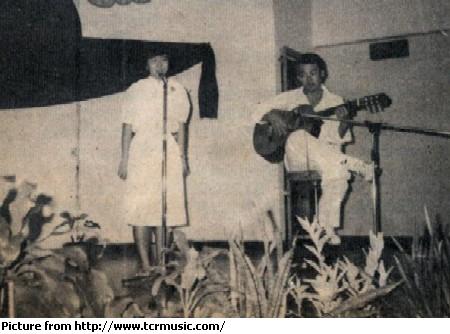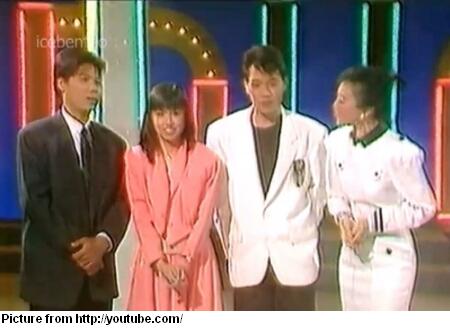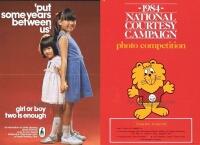Xinyao 新谣 stands for 新加坡歌谣, which literally means Singapore Chinese Folk Songs.
Started in early eighties, it was, in a certain way, influenced by the Taiwanese folk songs 台湾歌谣 and songs created by their college students 校园民歌, which had its origin as early as the 1930s and hit the peak in the seventies and eighties.

In 1981, some music-loving students at the National Junior College started a song-writing competition, attracting many passionate responses and creating awareness for composing local-styled songs.

As it developed, xinyao, led by talented local composer and lyricist Liang Wern Fook 梁文福, began to gain popularity among youngsters with its clear acoustics, simple melodies and sentimental lyrics, usually accompanied by only the guitar. The music was clean and light, differing greatly from techno or heavy metal.
It is not exaggerating to say xinyao was the spark that inspired the local music industry which had blossomed since the late nineties, producing the likes of Kit Chan, Tanya Chua, Stefanie Sun and JJ Lin.

Liang Wern Fook produced many classic xinyao pieces in the eighties, the most popular being “Flowing Water” 细水长流, “A Step at a Time” 一步一步来, “The Eve of History Exam” 历史考试前夕, “Singapore Style” 新加坡派 and “I Left my Shadow to You” 我将背影留给你们.
“Singapore Style” 新加坡派 is a brilliant piece which describes Singapore from the sixties to the nineties, mentioning Jurong Industry, SMRT, HDB flats and other Singaporean stuff. (Thanks to musicboxforever for creating this interesting music video)
Other notable xinyao singers emerged, such as Yan Liming 颜黎明 (with representative hits such as “This Class of Ours” 我们这一班, “A Stroll in the Moonlight” 月色同行), Jiang Hu 姜鄠 (“Resting of Love” 恋之憩), Hong Shaoxuan 洪邵轩 (“Are You Still Here” 你是不是还在, “The Other Face of Age” 岁月的另一张脸) and Pan Ying 潘盈 (“Let the Night Falls Silently” 让夜轻轻落下). Many were singing the works of Liang Wern Fook and other xinyao pioneers, whereas some were inspired to do the composition of the music themselves.
Love duets were also popular, such as “Your Shadow” <你的倒影> by Yan Liming and Hong Shaoxuan. “Encounter” <邂逅> by Eric Moo 巫启贤 and Liang Huizhen 黄譓祯 even became the first xinyao song to record an entry in Singapore’s billboard of mandarin pop in 1983.
Some of the xinyao were used as theme songs for local mandarin dramas at Channel 8; an example being Yan Liming’s catchy song of “Youth 123” <青春123>.
Moving into early nineties, the nature of xinyao changed and moved towards commercialisation, perhaps influenced by the popularity of new-age mandarin pop from Taiwan and Hong Kong.
The songs became sophisticated, with more elements of musical instruments added, as the need to cater to mass market deepened. The unique local flavour of xinyao diluted rapidly, and the days of purity and innocence of local songs were gone after a decade of brilliance and creativity.
Published: 13 October 2011
Updated: 09 August 2016









I listen to the xinyao songs from time to time, thanks for bringing it back. The 80s is the period in my life i still can’t break out of. For many reasons i’m glad to move forward in life today but for just as many reasons, i wish i could go back to to the past to re-live my life again……..
sighz.. That’s life I guess
Things will always never be the same again
Dont need to mention about 80s. I am already feeling the total difference from now and during the 90s. I miss those days without those foreigners, and Singaporeans living together with the different races we always feel comfortable with. I dont know about now, and whether I can live happily with so many new immigrants. I know some of them are trying hard to integrate into our society and i thank them for that, but not all do.
Hi Jonathan.. I totally agreed w u!! Not only me.. My friz too.. Those 70-80s.. 90s too.. We just miss those dayz without those foreigner.. Our country were a lot peaceful n we Singaporean hav tat sense of belonging too!! Can’t say e same for now tho :-(( is really upset tat we loss our sense of identity!! Is really sad..
Just appreciate what we have so far and look for better future and remember the good things of the past
If I could recall, Jurong JC had cultivated many xinyao singles at that era. 巫启贤and many of them started from there.
However, the development of xinyao could be begun from an ex-Nanyang University graduate 张泛Ken Chang。In c.1980,张泛published his first song piece and in 1982, 《传灯》was published. Although this song was not popular in Singapore, it became a theme song for the Malaysian Chinese since then.
Valuable info! Thumbs up…
i like your blog a lot.. very informative 😀
I learnt a lot more about xinyao just by reading this blog post and the comments. It would be lovely if xinyao can be more formally recognised as one of our unique ‘soft’ cultures – definitely more representative than Little Nyonya which was more Melaka than Singapore.
So glad to chance upon this! I really like xinyao – I listened to all those familiar songs as a kid growing up in the 1980s. And it really struck a chord when 细水长流 was reprised and popularised again in 1998, the year I graduated from JC.
Listening to these songs make me wish that we can go back to those days where times were simpler, and frankly everyone were happier.
Thanks for sharing, I really miss XinYao, coz I came from there…
Hi, I am a student and I’m doing a project on Xinyao. I’m looking for people to interview (via email) regarding the issue, specifically on how globalization has affected the local Singaporean music scene, from Xinyao in the 1980s to the Korean Wave and Japanese pop culture in the 21st century. If anyone is interested, please respond to this link by 5th August 2012: https://docs.google.com/spreadsheet/viewform?formkey=dE01X3oxeVI5djllbURLZTFPV0dIMVE6MQ#gid=0
Thank you! 🙂
p/s: Please help me to spread the word around to your friends and family as well! Thank you!
These songs got me up and sing like a teenage boy again ! I really misses those days.
Pingback: 与新谣邂逅:唱过的同一首歌 « 新国志
i’m really honored to be able to know xin yao and i’ve really grown great interest in xin yao. thanks guys 🙂
(新加坡讯) 因涉及几句方言,梁文福经典新谣歌曲《麻雀衔竹枝》一禁20多年,20多年后仍被电台所禁,难“重见天日”!
《麻雀衔竹枝》是梁文福于1990年“新加坡派”专辑里的歌曲,当年因方言被禁播,20多年后,新加坡导演蔡于位开拍新谣电影《我的朋友,我的同学,我爱过的一切》,《麻雀》成了电影开场的主打歌曲,蔡于位意图让《麻雀》“飞”入电台,不料仍遭遇“禁播”命运。
《我》片导演蔡于位日前接受记者访问,很感慨表示:“当电台说不能播(《麻雀衔竹枝》)时,我觉得很可惜,还以为一首涉及方言的歌曲在20多年后尺度会放宽,没想到还是不行!”
蔡于位说,他先后问过两家电台,但得到的答案都是“播不得”,蔡于位有点不甘心,笑言有点为梁文福打抱不平,他说:“其实,这首歌曲很能代表新加坡,对身在海外的新加坡人来说,更加有意义。”
《麻雀衔竹枝》歌词有一句:“小小麻雀担竹枝,都系担番屋企好得多”(意即:麻雀要衔竹枝造安乐窝,最好还是回自己的家),还有“我们这里是新加坡,我阿爹系海山街住过”,歌词洋溢道地新加坡风情,也非常口语化。
没想到20多年前后,《麻雀》仍“飞不出鸟笼”。
Good news! 《麻雀衔竹枝》 has been unbanned on radio with effect from today, after a long 23 years….
堆积情感 is not a xinyao song.
词曲:黄大军(Taiwanese)
Besides 姜鄠,黎明and邝美云have also recorded this song. 姜鄠recorded this song when he tried to break into the Taiwanese market.
However, he is the 1st whom sang it back then. In the end, 姜鄠 ‘s record company did not help him to break into TW market, he only flew to TW attended in house concert with polygram’s artiste.
does anyone know a song, i remember learning it in 1992…part of the lyrics go like this:
你的温馨取走了黑暗,带给我光芒,带给我希望
Pingback: 与新谣邂逅:唱过的同一首歌(Xinyao) | 从夜暮到黎明 From dusk to dawn
Hi, do anyone know where the place can hear xinyoa song in Singapore?
hello! there is a music café at aperia, MusicDreamer Live! Café (http://musicdreamer.com/) that does xinyao, minyao and oldies on Tuesdays! you may want to drop by one day. 🙂
Please advise where can I buy Xin Yao best hits collection CDs? Thanks.
https://www.channel8news.sg/news8/lifestyle/20180922-sg-yanliming/4136286.html (新谣阿姐颜黎明逝世 享年55岁/ 22 Sep 2018)
RIP.. too young to depart this world
Hi it’s 2019. 2019 anyone lol